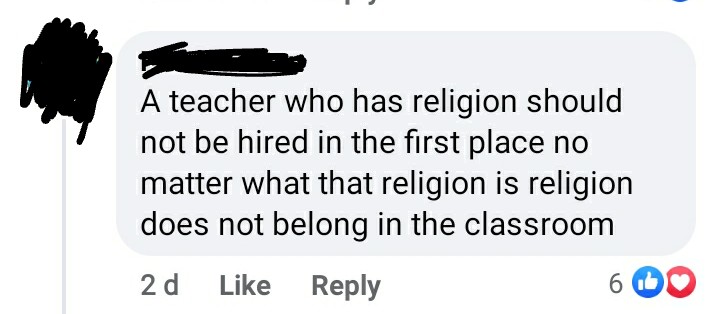Cast your minds back to 2019 and you may remember the outrage caused when a teacher at Dalriada––a grammar school in Ballymoney––wrote a pro-life sentiment on a whiteboard in response to the relaxation of Northern Ireland’s abortion laws. The outrage was such that it even made the news. In response, Dalriada’s principal Tom Skelton said this:
“Regardless of any individual’s personal position on the issues of gay marriage and abortion, it is completely unacceptable that such a display was posted in a school environment.”
“Dalriada should be a place where all of its pupils, staff and visitors feel welcomed, supported and able to learn, regardless of their sexuality, political views, medical history or religious beliefs.”
Mr Skelton then went on to assure those offended that the teacher in question had “apologised profusely,” before concluding:
“The school pastoral programme is also being reviewed to ensure that lessons on topics such as same-sex marriage and abortion are delivered in an age-appropriate, sensitive, non-judgemental manner which reflects the views of all.”
In other words, the political opinions and moral ideologies of the Dalriada teaching staff should be left out of the classroom, and lessons should be sensitive, even-handed and non-judgmental in their treatment of important social issues, like abortion.
Fast forward, then, to March 2022 and Hazelwood Integrated College, led by activist teacher and SDLP candidate for east Belfast, Charlotte Carson, took a slightly different approach when hosting a ‘feminist day’. And by ‘slightly different’ I mean their approach to the treatment of sensitive topics was more akin to that of a monster truck reversing over someone’s garden fence than that of an integrated school striving for non-judgmental inclusivity.
Not only was their widely-promoted feminist conference heavy on the pro-abortion apologetics, including the making of placards oozing with anti-Catholic sentiment, but it was attended––and celebrated––by several prominent politicians and abortion activist organisations. And yet, there was no outcry, no profuse apologising, and no BBC articles calling into question Hazelwood’s commitment to treating all views equally and with respect. And they say men have all the privilege.
So, what does this tell us about the true nature of integrated education? Quite a bit. Integrated Education, commonly construed, particularly in a Northern Irish context, is the simple act of educating children from disparate backgrounds, together. This is certainly a meritorious aim and one that most people think of when they hear the words “integrated education,” which is why, given our country’s troubled history, many right-minded people are in favour of it.
However, as Hazelwood’s feminist conference demonstrated, there’s a good bit more to it than that. Ideologies and moral frameworks do not exist in a vacuum; they must come from somewhere, and we all hold them. If an institution seeks to replace or neutralise one set of beliefs for the greater good of society––such as religious-based morality or political sectarianism–they won’t be replaced by mere neutrality; they will be replaced with someone else’s morality and a different kind of sectarianism.
This was plain to see for anyone following the glowing coverage of Hazelwood’s feminist conference on social media, where pictures of girls (no boys to be seen, by the way) were circulated of them holding self-made “keep your rosaries off my ovaries” placards. Interesting. Why zone in on Catholicism? It’s almost as if the organisers of this event don’t know that the pro-life view is very common amongst practising Catholics, or that other world religions also take exception to abortion (you know, the deliberate taking of human life).
So what of those Catholic and other religiously observant Hazelwood pupils? Being a diverse and inclusive school––if their multi-culture-depicting billboards are anything to go by––must mean that Hazelwood has at least some devout pro-life Catholic students under their tutelage. Would those pupils––or indeed any pupil of any religion who opposes abortion––have felt safe and welcomed at this conference? No, of course, they wouldn’t. Such an event would have been distinctly unwelcoming for them. These pupils would have been greeted with a kind of sectarianism not based on Green or Orange, but a new kind of sectarianism based on where they stand on progressive political policies. “Don’t agree with us on abortion? Here’s a placard of what we think of your stupid religion that claims all life is precious, you dinousaur!”
The biggest red flag of this event, however, was the adults using it as an evangelistic outreach/recruitment drive––namely, the angry, misanthropic abortion activist groups like Alliance for (abortion) Choice, an organisation not exactly known for its commitment to the kinds of standards one would expect of a school that wishes to “remain faithful to the true values of what an integrated school should be”. A cursory glance at these activists’ social media history often throws up grotesque artwork––both aesthetically and technically––appeals to eugenics (any pupils with Down syndrome or have a cleft palate at Hazelwood?) and, most disconcertingly, they have zero interest in engaging with even the most respectful of criticism, responding instead with mind-numbing GIFs and emojis, teaching children that you don’t have to defend your beliefs, you just have to assume and assert that they’re correct. Like the old religious men of yesteryear, these feminists believe their doctrines of Critical Race and Queer Theory are holier than your doctrines because Judith Butler tells them so.
Events like this, organised by activist teachers and promoted by people in power who have a clear political agenda, should be of considerable concern for any parent who wishes their child to develop into a well-rounded individual who respects others, even if they disagree with them. Like nature, morality abhors a vacuum, and a vacuum is exactly what integrated education provides––at least as it’s envisioned by schools like Hazelwood––into which someone’s ideology will be inserted. So, if you intend to send your child to Hazelwood, bear in mind: it’s not a case of if beliefs will be imposed on them, but which beliefs will be imposed.




